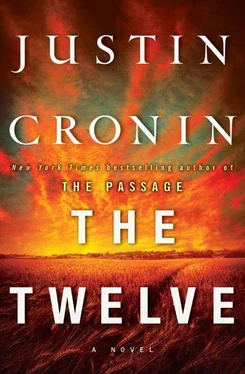Come to me , he thought. Come to me .
He raced headlong. He cast himself into the hands of God. He sensed but did not see Greer streaming toward him, and Wolgast barreling from behind with the bomb clutched to his chest, aiming his body for the heart of the pod. And in the last instant, Peter heard the words:
Amy, run .
And: Father—
And: I love you .
And as Wolgast dove into their midst, one clawed thumb poised on the plunger; and as Amy likewise swooped down upon Peter to hurl him away, taking the brunt of the destruction in his stead; and as the last of the Twelve in their fury fell upon Wolgast—Wolgast the True, the Father of All, and the One Who Loved—a hole in space opened where he had stood, dark night burst to brightest day, and the heavens rent with thunder.

66
It came to feel as if there were two cities in the minutes that followed: the grandstands, where chaos reigned, and the field below, a zone of aftermath, of sudden calm. A beginning and an ending, standing adjacent but apart. Soon the two would merge, as the crowd, the violence of its uprising exhausted, absorbed the amazing fact of its liberty and began to disperse, going where it liked, including the field; they would find it one by one, drifting down, moving tentatively as their bodies tasted freedom. But in the near term, the combatants on the field were left to themselves, to take a final measure of the living and the lost.
It was Alicia whom Peter awakened to see. She was blackened, bruised, bloodied. Much of her hair had been burned away, tendrils of smoke still rising. Peter, she was saying. She hovered above him, tears streaming down her cheeks. Peter.
He struggled to speak. His tongue moved heavily in his mouth: Amy? Is she—?
Alicia, softly weeping, shook her head.
Somehow Greer had survived. The blast had flung him far away. By all rights he should have been dead, and yet they found him lying on his back, staring at the starlit sky. His clothing was shredded and seared; otherwise he appeared untouched. It was as if the force of the blast had moved not through him but around him, his life protected by an invisible hand. For a long moment he neither spoke nor moved. Then, with an exploratory gesture, he raised a hand to his chest, patting it cautiously; he lifted it to his face, tracing his cheeks and brow and chin.
“I’ll be damned,” he said.
Eustace, too, would live. At first they believed he was dead; his face was drenched in blood. But the shot had gone wide; the blood was from his left ear, now gone, shorn like a plant plucked from soil and replaced by a puckered hole. Of the detonation itself he had no memory, or none he could fully assemble beyond a chain of isolated sensations: a skull-cracking blast of noise, and a scorching wave of air passing above, then something wet raining down, and a taste of smoke and dust. He would escape the night with only this one additional disfigurement to a face already bearing plentiful scars of war and a permanent ringing in his ears, which would, in fact, never abate, causing him to speak in an overly loud voice that would make people think he was angry even when he wasn’t. Over time, once he had returned to Kerrville and risen to the rank of colonel, serving as military liaison to the president’s staff, he would come to regard this as less an inconvenience than a remarkably useful enhancement to his authority; he wondered why he hadn’t thought of it before.
Only Nina would depart the field unscathed. Hurled away by the viral that had killed Tifty, she’d been thrown clear of the blast zone. She had been moving upfield when the bomb went off, its concussive force blowing her backward off her feet; but in the preceding moment she’d been the only one to witness the death of the Twelve, their bodies consumed and scattered in a ball of light. All else was a blur; of Amy, she had seen nothing.
Nothing at all.
But one of them had fallen.
They found Tifty with his gun still in his hand. He lay in the mud, broken and severed, his eyes rimmed by blood. His right arm was gone, but that was the least of it. As they gathered around him, he labored to speak through his fitful breathing. At last his lips formed words: “Where is she?”
Greer alone seemed to understand what he was asking. He turned toward Nina. “It’s you he wants.”
Perhaps she understood the nature of the request, perhaps not; none could tell. She lowered herself to the ground beside him. With trembling effort, Tifty lifted his hand and touched her face with the tips of his fingers, the gentlest gesture.
“Nitia,” he whispered. “My Nitia.”
“I’m Nina.”
“No. You’re Nitia. My Nitia.” He gave a tearful smile. “You look… so much like her.”
“Like who?”
Life was ebbing from his eyes. “I told her …” His breath caught. He had begun to choke on the blood that poured from his mouth. “I told her… I would keep you safe.” Then the light in his eyes went out and he was gone.
No one spoke. One of their own had slipped away, into darkness.
“I don’t understand,” Alicia said. She glanced at the others. “Why did he call her that?”
It was Greer who answered: “Because that’s her name.” Nina looked up from the body. “You didn’t know, did you?” he said. “There was no way you could.”
She shook her head.
“Tifty was your father.”
In due course, there would come a full accounting. A pickup would race onto the field; they would watch three people emerge. No, four. Michael and Hollis and Sara, holding a little girl in her arms.
But for now they stood silently in the presence of their friend, the core of his life laid bare. The great gangster Tifty Lamont, captain of the Expeditionary. They would bury him where he’d fallen, in the field. Because you never leave it, Greer explained; that’s what Tifty always said. You might think you can do it, but you can’t. Once you’d stood there, it became a part of you forever.
No one ever left the field.
XII. THE KISS


67
The weather failed to cooperate. January in Iowa—what had they expected? Bone-numbing day followed bone-numbing day. Food, fuel, water, electricity, the complex enterprise of keeping a city of seventy thousand souls running—the joy of victory had quickly been subsumed by more mundane concerns. For the time being the insurgency had assumed control, though Eustace, by his own admission, had no particular knack for the job. He felt overwhelmed by the volume of detail, and the hastily assembled provisional government, composed of appointed delegates from each of the lodges, did little to lighten his load; it was bloated and disorganized, half the room always squabbling with the other half, leaving Eustace to throw up his hands and make all the decisions anyway. A degree of docility among the population remained, but this wouldn’t last. There had been looting in the market before Eustace was able to secure it, and every day there were more stories of reprisals; many of the cols had tried to slip anonymously into the populace, but their faces were known. Without a justice system to try the ones who surrendered, or those who had been captured by the insurgency in advance of the mob, it was hard to know what to do with them. The detention center was bursting at the seams. Eustace had raised the possibility of retrofitting the Project—it was certainly secure enough and had the additional advantage of isolation—but this would take time and did nothing to address the problem of what to do with the prisoners when the population began to move south.
Читать дальше














